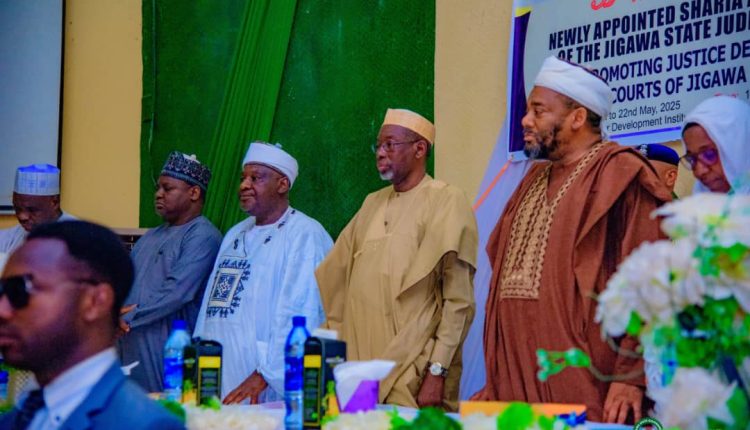Governor Namadi pledges continued support for justice reforms, urges equity
|
Getting your Trinity Audio player ready...
|
By Abdullahi Idris, Dutse
Jigawa State Governor Umar Namadi has reiterated the commitment of his administration to deepening judicial reforms and strengthening the justice sector.
He stated this while declaring open a two-day capacity-building workshop organized by the Jigawa State Judicial Service Commission (JSC) for newly appointed Shari’a Court Judges at the Manpower Development Institute, Dutse.
Delivering his speech, the governor said that “in a constitutional democracy such as ours, the functions of the judiciary in ensuring an effective and well-functioning polity could not be overemphasized.”
“While the constitution assigns equal weight to all three organs of government in ensuring conformity, observance, and application of the constitutional provisions under the section, I believe the ultimate burden of responsibility in ensuring “social justice” in any human society rests with the judiciary.”
He acknowledged the reforms being implemented by the Jigawa State Judiciary and commended the JSC under the leadership of the Chief Judge for organizing the training.
“Over the years, several institutional and governance reforms aimed at promoting good governance in our state were pursued by successive governments. One such reform was in the area of administration of justice, which aimed to bring about comprehensive improvements in the delivery of justice to the people in terms of accessibility, timeliness, equity, and justice.”
While addressing the newly appointed Shari’a Court Judges, Governor Namadi charged them to uphold integrity and justice in carrying out their duties:
“You have solemnly sworn that you will, among other very weighty affirmations, strive to preserve the Fundamental Objectives and Directive Principles of State Policy contained in the Constitution of the Federal Republic of Nigeria, and that you will do right to all manner of people, according to law, without fear or favor.”
He reminded them of their spiritual responsibility as Muslims:
As Allah (SWT), the All-Knowing, All-Seeing, and All-Hearing, said in the Glorious Quran, “… Whoso doeth righteousness an atom’s weight will see it … and whoso doeth evil an atom’s weight will see it….” Therefore, beyond the oath that you have taken, I urge you to be ever mindful of this admonition from none other than your Creator.
“We expect every one of you to discharge his duties and responsibilities with utmost fear of Allah, ensuring impartiality and fairness among the people. You should consistently endeavour to uphold justice in all your court proceedings.
Governor Namadi assured the judiciary of his administration’s continued support for the effective discharge of its responsibilities.
“Even as we commit to remain resolute in our pursuit of justice sector reforms, we will also continue to support sustained improvements in judicial infrastructure/facilities, improved staff welfare, capacity building and training for state judges and other judiciary staff, as well as sustained collaboration between the judiciary and executive arms to promote peace, security, social justice, and social cohesion among individuals and communities in the state.”
In his remarks, the Hon. Chief Judge of Jigawa State and Chairman of the Judicial Service Commission, Hon. Justice Umar M. Sadiq, described the workshop as “a substantial turning point in our efforts to enhance the capacity of our Shari’a Court Alkalis to ensure that justice is not only done but is seen to be done.”
Justice Sadiq asserted that a judge’s knowledge of the law is their sole tool for reaching fair, expeditious, and impartial decisions.
“This workshop is not only timely, but apt as it provides an opportunity for the newly appointed Alkalis to be reminded about the basic skills and knowledge of the rudiment of adjudication. It is the only weapon available to any judge for making fair, expeditious, and impartial decisions, and you cannot be an exception to this.”
The workshop forms part of the broader institutional strengthening efforts being championed by the Namadi administration under its 12-point development agenda, particularly in the areas of governance,institutional reforms, and justice delivery.



Comments are closed, but trackbacks and pingbacks are open.